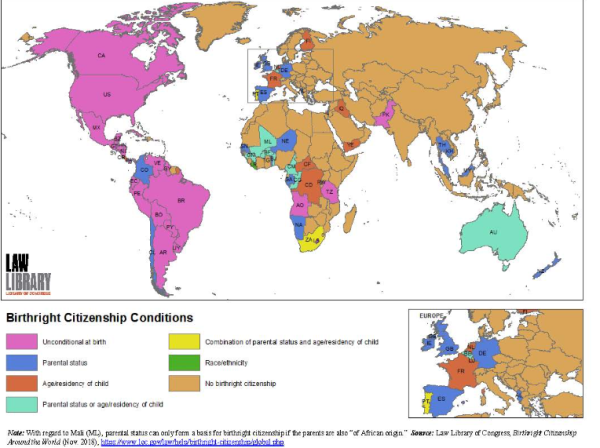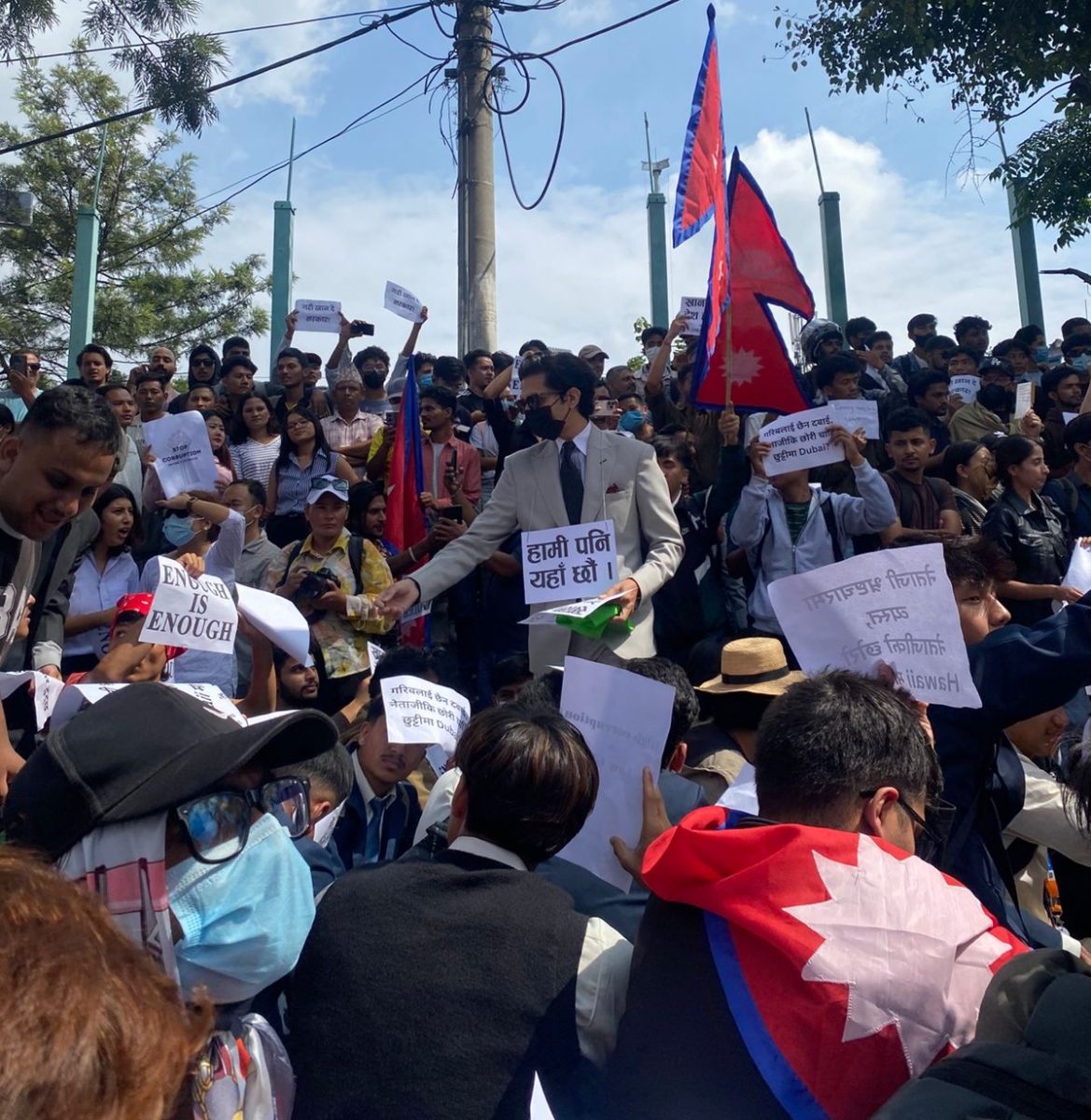Since the founding of the country, policies regarding immigration have been important to politics. One of the first policies regarding immigration passed by the United States Government was the Naturalization Act of 1790. The Naturalization Act of 1790 limited naturalization, the process of becoming a citizen to only, “free white person(s) … of good character.”
Eight years after the Naturalization Act of 1790, the Alien and Sedition Act was signed into law. The act was a set of four laws, enacted in 1798, that applied restrictions to immigration and speech within the United States. Three of these laws affected immigration. The Naturalization act of 1798 increased the requirements to become a naturalized citizen, changing the time requirement from five years to 14 years. This portion was later readjusted to the original time requirement. The Alien Friends Act of 1798 allowed the president to imprison and deport non-citizens. This act was then revoked in 1802. The Alien Enemies Act of 1798 gave the president additional power to detain non-citizens during times of war, invasion or predatory incursion. This act was invoked by President James Madison during the War of 1812, and was later updated in 1918 to include both genders. The Sedition Act of 1798 criminalized false and malicious statements about the federal government. This act expired in 1800.
Immigration is not only an issue during war time but also after war. In the years following the American Civil War, Congress amended the constitution three times. The 13th, 14th and 15th amendments to the constitution are commonly known as the reconstruction amendments. The 13th Amendment abolished slavery, the 14th Amendment gave citizenship to all those born in the United States and the 15th Amendment gave newly freed African American males the right to vote. The 14th Amendment has recently become a topic of debate.

This debate over what is known as jus soli, or more commonly birthright citizenship, dates back to both the Civil War and Chinese immigration during the 1880s. After the Civil War, the 13th, 14th and 15th Amendments were ratified. These are commonly known as the reconstruction amendments. The 13th Amendment ended slavery except as punishment for a crime. The 14th Amendment made all, “Persons born or naturalized in the United States, and subject to the jurisdiction thereof, are citizens of the United States and of the State wherein they reside.” Lastly the 15th Amendment made, “The right of citizens of the United States to vote shall not be denied or abridged by the United States or by any State on account of race, color, or previous condition of servitude.” In 1882, the Chinese Exclusion act was passed. This act prohibited all immigration of Chinese laborers for 10 years. In 1898, a landmark decision from the Supreme Court found that any Chinese person born no matter their parents citizenship status became a citizen. The decision established a precedent through its interpretation of the Citizenship clause of the 14th Amendment to the Constitution.
During World War I, President Woodrow Wilson invoked the Alien Enemies Act against those born in the Central Powers. After the bombing of Pearl Harbor in World War II, President Franklin Roosevelt, invoked the Alien Enemies Act to remove Japanese, German and Italian non-citizens. President Roosevelt later cited further wartime powers to intern Japanese Americans in Executive Order 9066.
During President George W. Bush’s tenure in office, about eight million immigrants moved to the United States. During his terms, he urged congress to allow about 12 million undocumented immigrants to work in the United States through creating a temporary guest worker program. President Bush also asked Congress to provide additional funds for border security and deploy 6,000 more National Guard Troops to the southern border. He also strongly supported the 2007 Comprehensive Immigration Reform Act. This act, written by a bipartisan group of senators with the participation of the Bush-Cheney Administration, would have changed the immigration process.
After President Bush’s tenure in office, immigration was a salient issue. During President Barack Obama’s time in office he was nicknamed the “Deporter in Chief,” due to his administration’s record breaking deportations of 3 million people throughout his tenure in office. However, he also passed policies that sought to reform immigration. One immigration policy that President Obama announced was the Deferred Action for Childhood Arrivals (DACA). This act protected 700,000 undocumented immigrants from deportation, though it only affected those who came to the United States before their 16th birthday. During President Donald Trump’s first term in office he rescinded DACA through an executive order. When President Joe Biden was elected to office, he kept a campaign promise and reinstated DACA.
In President Trump’s first term in office, his administration made immigration a priority. One of his campaign promises was to build a wall along the United States Mexico border. The Trump-Pence Administration was able to construct and replace over 400 miles of border barriers. In 2019, President Trump declared a national emergency which redirected military funds to continue the wall’s construction. Another immigration policy that the Trump-Pence Administration introduced was the “zero tolerance” policy. This policy aimed to deter illegal immigration through separating migrant children from their parents or guardians. This policy was highly controversial, with many human rights organizations calling it inhumane. President Trump signed an executive order which banned foreign nationals from seven countries that were Muslim-majority countries. This executive order also suspended the U.S Refugee Admissions Program (USRAP) for 120 days, revoked 60,000 visas and when the USRAP resumed it would prioritize claims from religious minorities in their home countries. This executive order faced legal challenges which led to nationwide protests and court injunctions. A federal judge issued a temporary restraining order which halted the enforcement of this order. Another iteration of the travel ban was introduced in 2017, which expanded restrictions to include other countries like North Korea and Venezuela.
After President Biden won the 2020 election, crossings at the southern border soared, reaching a record high in December of 2023. Throughout 2024, crossings began to decline because of restrictions that he put into place on the asylum process. These restrictions were primarily on migrants who immigrated between ports of entry. President Biden supported the U.S Citizenship Act of 2021, which was proposed on his first day in office. This act sought to allow the Department of Homeland Security to close the border when the encounters reached a seven-day average of 5,000 or exceeded 8,500 in a single day.
In President Trump’s second term in office, immigration has been a key issue. On the campaign trail, President Trump spoke of “migrant crime” and Haitian immigrants eating pets in Springfield, Ohio. A specific migrant crime that would later receive national attention was the murder of 22-year-old nursing student Laken Riley. Riley was killed while jogging through Athens, Georgia. Her murderer was a 26-year-old Venezuelan man who entered the United States illegally. This event led to the Laken Riley Act, requiring federal detention of undocumented immigrants arrested for burglary or theft. It was the first bill that President Trump signed into law during his second term in office.
President Trump also signed a slew of executive orders targeting illegal immigration. He revoked “harmful” executive orders that the Biden-Harris Administration signed. Of the revoked executive orders, two of them were related to immigration, “Revision of Civil Immigration Enforcement Policies and Priorities” and “Restoring Faith in Our Legal Immigration Systems and Strengthening Integration and Inclusion Efforts for New Americans.”
President Trump declared a national emergency at the southern border through executive order. This gave the Department of Defense more power to support the Federal Government’s response to this emergency. He also designated cartels as terrorist organizations, making new legal and policy tools available that could help deter these organizations. President Trump also expanded capacity for Guantanamo Bay. President Trump announced his plans for creating a Gold Card that would replace the Green Card program. The Green Card program was created to grant applicants the ability to live and work within the United States. The Gold Card Program would offer foreign investors a pathway to citizenship and lawful permanent residence if they invest $5 million into the United States.
On Mar. 15 2025, President Trump invoked the Alien Enemies Act against Tren De Aragua (TdA), a Venezuelan gang that the Trump-Vance administration says “ Commits brutal crimes, including murders, kidnappings, extortions, and human, drug, and weapons trafficking.” TdA has also “engaged in and continues to engage in mass illegal migration to the United States to further its objectives of harming United States citizens, undermining public safety,” the Trump-Vance administration proclaimed. This invocation of the act gives the President more powers to deport those who are part of TdA. However, while most of those deported may be part of the gang, several are not.
Kilmar Abrego Garcia was deported to an El Salvadorian prison known commonly as CECOT. He lived in the United States for 14 years, worked in construction in Maryland and raised three children. The Trump-Vance administration claimed that Abrego Garcia is an MS-13 gang member. MS-13 is an international criminal gang that the Trump Administration designated as Foreign Terrorist Organizations (FTOs) and Specially Designated Global Terrorists (SDGTs).
Abrego Garcia grew up in El Salvador his mom ran a family business out of their home in San Salvador. Abrego Garcia and his family would make deliveries to its customers. While in El Salvador his family was extorted by Barrio 18, an El Salvadorian gang, they would pay money to them and if they didn’t then they would harm them. In October 2019 a judge granted his request for a “withholding of removal” based on his “well-founded” fear of persecution by Barrio 18. The government did not appeal, so the ruling is final. A withholding of removal means that an individual is protected from being returned to his or her home country and receives the right to remain in the United States and work legally. The United States acknowledges that Abrego Garcia was subject to a withholding order forbidding his removal to El Salvador, and that the removal to El Salvador was therefore illegal.
The Supreme Court ruled unanimously that the Trump Administration’s removal of Abrego Garcia was illegal. The Supreme Court also required the United States to “facilitate” Abrego Garcia’s return. On Apr 15, 2025, President Trump and President Nayib Bukele met in the oval office where President Trump was heard on a microphone saying that “homegrown criminals are next.” The broader context revolved around CECOT where he also added, “You are going to need about five more places [prisons].”
Just two days after President Trump’s comment, United States Senator Chris Van Hollen, a Democrat from Maryland, visited his constituent at CECOT. There he met with El Salvadorian President Bukele. After his conversation with President Bukele he was able to talk with Abrego Garcia. The White House then criticized Senator Van Hollen’s lack of “Concern for Americans Brutalized by Illegal Immigrant Crime.” After Senator Van Hollen’s visit to El Salvador, Abrego Garcia was transferred out of CECOT into another prison in El Salvador.
The future for immigrants like Abrego Garcia is unknown, however public sentiment in the United States is shifting. Apr 30 marks 100 days of the second Trump Administration, and recent polling shows that President Trump has an approval rating of 40%. While President Trump’s overall approval rating is 40%, the nation is more divided on the issue of immigration, with 48% of the general public believing that the administration has gone too far when deporting immigrants living in the United States “illegally.” When one accounts for partisan identity, the divide deepens with 78% of Democrats believing that they’ve gone too far and only 16% of Republicans. These numbers overall show stronger disapproval of the second Trump administration than earlier polls suggested.
As the 2026 midterm elections approach, immigration may be a prominent issue in North Carolina. This issue will likely be prevalent, as while Republicans carried North Carolina in the 2024 presidential race, they lost several key statewide offices, including governor, attorney general, lieutenant governor and seats on the state Supreme Court. This partisan divide may cause competitive races in the United States Houses of Representatives and the Senate.
As the midterms approach, immigration is not just a policy debate, but also a potential political vulnerability. It is a potential turning point for battleground states like North Carolina. How voters react to these policies may determine the direction of immigration policy for years to come.




















